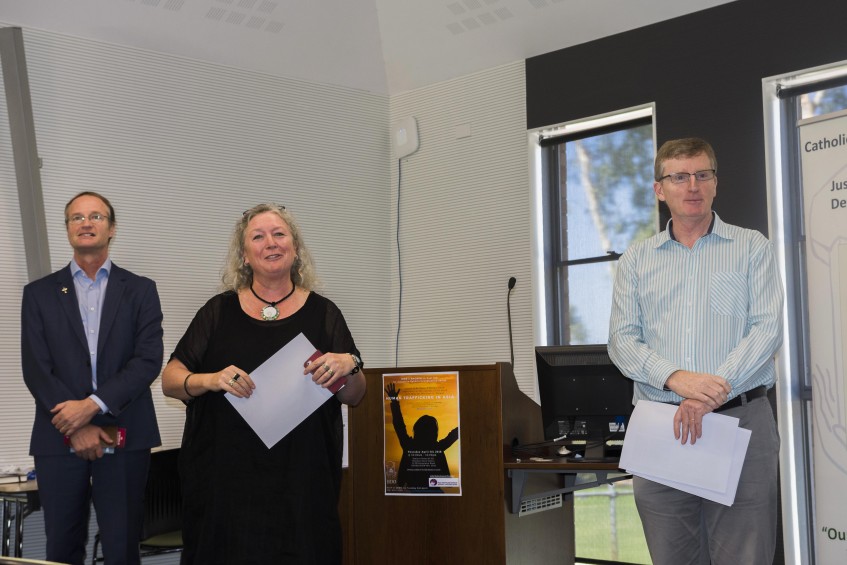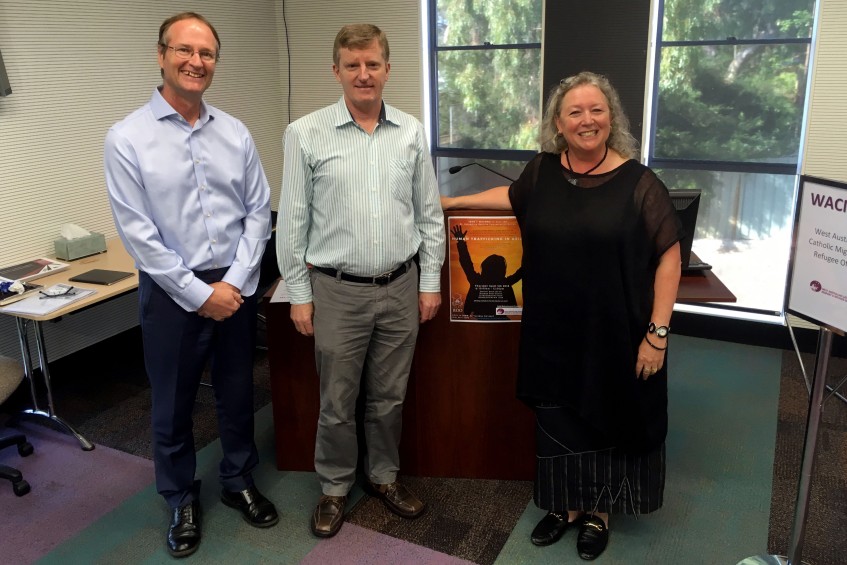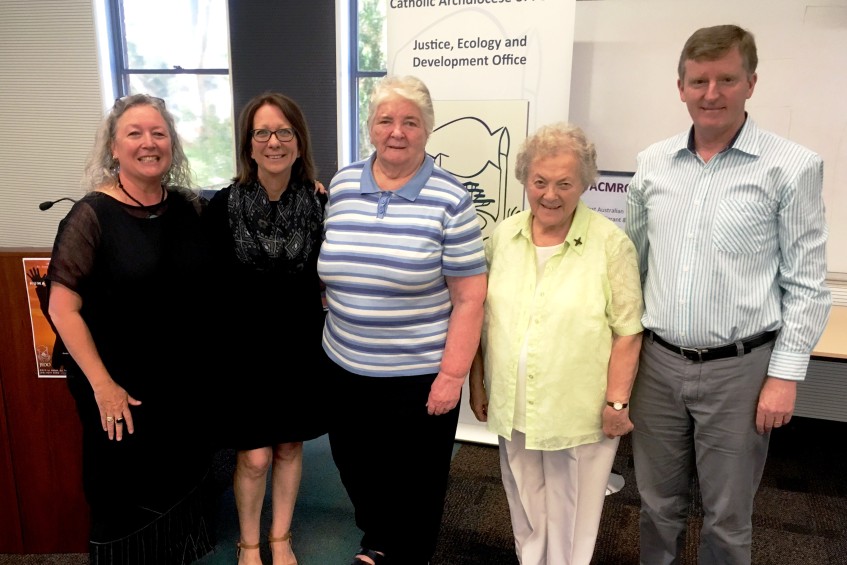Columban Priest highlights hopes of combatting human trafficking in Australia

WACMRO Director Deacon Gregory Lowe and JEDO Director Carol Mitchell joins Columban Priest Father O’Neill during a Q&A session after his talk on Human Trafficking in Asia. Photo: Amanda Murthy
By Amanda Murthy
“We the Church have to show the love of Christ towards migrants, and defend those who are victims of human trafficking. We have to be the voice of the voiceless.”
These sentiments were delivered by Melbourne-born Columban Missionary Priest Father Peter O’Neill SSC, who was in Western Australia on Thursday 5 April to share some of his first-hand experiences following his missionary work in Taiwan, where he witnessed what he describes as “modern slavery at its worst”.
According to the 2017 International Labour Organisation & Walk Free Foundation report, there are 5.4 victims of modern slavery for every 1000 people in the world.
These startling facts and more were uncovered at a two-hour talk organised by and the Australian Catholic Religious Against Trafficking in Humans (ACRATH) in partnership with the West Australian Catholic Migrant and Refugee Office (WACMRO) and the Justice, Ecology and Development Office (JEDO) held at the Newman Siena Centre.
The talk was attended by numerous Catholic religious groups and Archdiocesan agency staff including WACMRO Director Deacon Gregory Lowe and JEDO Director Carol Mitchell, who is also an ACRATH member.

WACMRO Director Deacon Gregory Lowe and JEDO Director Carol Mitchell joins Columban Priest Father O’Neill are all part of organisations fighting for the causes of human trafficking and slavery, faith, migrant workers, asylum seekers and refugees, ecology, and climate change issues in Australia. Photo: Carol Mitchell.
WACMRO and JEDO co-hosted the event in Doubleview under the St Josephine Bakhita Conversation Series – Fr Peter O’Neill’s presentation, Human Trafficking in Asia, was the inaugural talk under this title.
For 27 years, Fr O’Neill ran migrant shelters, provided pastoral support and advocated for human rights under the St Columbans Mission Society, where he worked tirelessly to champion the rights of undocumented migrant workers in Taiwan.
According to statistics revealed by Fr O’Neill, in 2017 there were 15.4 million victims of forced labour in Asia – 676,875 who are migrant workers from Taiwan.
“Majority of these victims in Taiwan came from the industries of carers or domestic workers (37.3 per cent), manufacturing (60.2 per cent), fishery (1.8 per cent) and construction (0.7 per cent),” he said.
“They were abused physically, mentally, sexually by their offenders, and forced to work an average of 16 hours daily.”
Fr O’Neill said only 55 per cent of their monthly salary – which was an average of $225 – would then be deducted by the employer for expenses like food and accommodation, Taiwan broker service fees, tax, health check-ups, visa fees, insurance, and placement fees, thus leaving them with a small amount to last them for the month.
Migrant workers from some of the poorer Asian countries would also have to pay a placement fee of up to $6000 to their agencies, in addition to a monthly service fee of up to $2000 to their broker before even starting the job.

Some of the ACRATH (WA) members present, Carol Mitchell, Kathy Fagan, Sr Ann McGlinn and Sr Marie Therese Ryder posing together with Fr Peter O’Neill SSC before his talk titled Human Trafficking in Asia. Photo: Amanda Murthy.
Now an ACRATH member, Fr O’Neill has been based at the Columban Mission Centre in Melbourne as the Mission Society’s Peace, Ecology and Justice Coordinator since last July.
He hopes to use his expertise to further support the Australian Catholic Religious Against Trafficking in Humans on human trafficking and slavery, faith, migrant workers, asylum seekers and refugees, ecology, and climate change issues.
“Our mission has always stayed focused on educating and empowering migrant workers, victims/survivors of human trafficking, to work with governments and migrant workers and victims/survivors to address labour and social difficulties and foster integration with local communities and churches.”
“We must continue to strive to provide psychological care to migrants and victim/survivors of human trafficking, to build regional and international networks with others working in this ministry, and to build supportive and prayerful communities,” he added.
